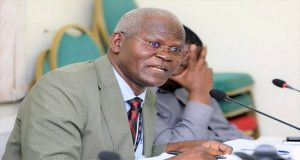
UMEME staff at work
By Smartson Ainomugisha
On December 8th, 2022, Umeme issued a public notice indicating that the Government of Uganda confirmed that Umeme’s current 20-year Concession, which expires on March 30th, 2025, will not be renewed.
Several factors have been highlighted as the reason for the government’s decision. Still, the high cost of power tariffs, linked to UMEME’s Concession—especially the agreed 20% return on investment, which the deal expensive for power consumers in Uganda.
Indeed, during the 2021 Labour Day celebrations, President Yoweri Museveni expressed displeasure with Umeme over the failure to cut down electricity tariffs, hampering the industrialisation agenda and, ultimately, job creation and poverty reduction efforts.
To prepare for Umeme’s exit, government has already embarked on preparing the Uganda Electricity Distribution Company Limited (UEDCL) to take over Umeme’s role of power distribution in the country. After the takeover, it is envisaged that power for industrial parks will go straight from generation sites to factories with no third party, thus lowering the overall power tariff for industries.
It is worth noting that by the time Umeme was established in 2005, the Uganda Electricity Board (UEB), which oversaw power distribution and supply in Uganda, was grappling with power outages. Due to a dilapidated network, the sector lost 4kWh for every 10kWh of power produced. Also, the sector was heavily reliant on government subsidies. A World Bank study in 1998 showed that Uganda’s electricity system was not financially viable because of distribution inefficiency, characterised by high energy losses (40%) and uncollected bills.
As of 2021, Umeme had improved the electricity distribution efficiency from 50% in 2005 to 83% by reducing energy losses from 38% in 2005 to 18%. The number of transformers has increased from 6,000 in 2005 to 14,833 in 2022, and customers connected to the power grid have increased by more than fivefold, from 294,000 in 2005 to over 1.6 million in 2022. Regarding revenue collections, Umeme remitted to Uganda Revenue Authority taxes amounting to UGX 106 billion in 2021.
In the December 2022 public notice, Umeme promised it will remain committed to performing its obligations as per the existing concession Agreements and will continue to operate and maintain the electricity distribution system in line with prudent utility practice to ensure continued service delivery through to the end of the concession. However, the remaining two years before the concession expiry will probably challenge Umeme and its customers.
First, Umeme is likely not to invest in new electricity distribution and supply systems since they are expensive and may require over two years to set up, notwithstanding the short time for any recovery of costs. The focus will likely be on maintaining the existing systems and serving the current customers. As a result, the growth in the number of new customers connected to the grid may slow down compared to previous years.
Second, Umeme is likely to experience the challenge of high staff turnover. While the staff turnover rate at Umeme was low at 4% in 2021, the certainty of no concession renewal could have triggered job insecurity among Umeme’s staff. Several employees may leave Umeme for jobs elsewhere, for instance, Uganda Electricity Distribution Company Limited, so they do not find themselves jobless.
If several key employees exit Umeme, power supply quality and reliability will likely be affected. In case of power outages/issues, downtime is likely to rise as the number of staff may be limited to respond swiftly to a multitude of issues reported through Umeme’s 24/7 contact centre, digital channels and 47 service centres across the country. Umeme may require providing powerful incentives to retain staff in the Concession’s period remaining.
Third, power blackouts and load shedding resulting from reduced investment in infrastructure and the vandalism of key electricity infrastructure material such as pylon angle bars, wires/conductors, transformers, transformer oils, poles, and underground cables, among others, may worsen. Vandalism remains a critical challenge in the electricity sub-sector, and Umeme incurred about 26 billion Shillings in 2021 to replace vandalised lines and transformers across the country. Uganda police should therefore step-up operations to safeguard electricity infrastructure from vandals across the country.
The recently passed Electricity (Amendment) Act, 2022, whose Section 85 (3) prescribes a 15-year jail term or fine of 100,000 currency points (nearly UGX 2 billion) or both for any person convicted of theft or vandalism of electric materials should be strictly enforced to curb down the vice as Umeme may not replace some vandalised infrastructure.
In addition, cases of power theft and illegal connections may rise. In 2021 alone, about 8,000 people are reported to have been illegally connected to the power grid, mostly in Greater Kampala Metropolitan, Jinja and the surrounding areas. Illegal connections overload transformers with unaccounted-for customers, which affects the power supply. Also, such connections result in deaths by electrocution. A 2018 Umeme incident report found that illegal connections were responsible for 48 per cent of the electrocution cases. Umeme should therefore work closely with the Uganda police to expeditiously deal with the challenges of power theft and illegal connections.
Source: Economic Policy Research Centre – EPRC







